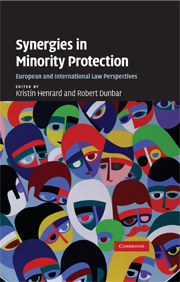Book contents
- Frontmatter
- Contents
- Foreword
- Abbreviations
- 1 Introduction
- PART A Minorities-specific instruments, provisions and institutions
- 2 The United Nations International Covenant on Civil and Political Rights: Article 27 and other provisions
- 3 The United Nations Working Group on Minorities
- 4 The OSCE High Commissioner on National Minorities
- 5 The Council of Europe's Framework Convention for the Protection of National Minorities
- 6 The Council of Europe's European Charter for Regional or Minority Languages
- PART B Non-minorities-specific instruments, provisions and institutions
- Index
- References
2 - The United Nations International Covenant on Civil and Political Rights: Article 27 and other provisions
from PART A - Minorities-specific instruments, provisions and institutions
Published online by Cambridge University Press: 21 July 2009
- Frontmatter
- Contents
- Foreword
- Abbreviations
- 1 Introduction
- PART A Minorities-specific instruments, provisions and institutions
- 2 The United Nations International Covenant on Civil and Political Rights: Article 27 and other provisions
- 3 The United Nations Working Group on Minorities
- 4 The OSCE High Commissioner on National Minorities
- 5 The Council of Europe's Framework Convention for the Protection of National Minorities
- 6 The Council of Europe's European Charter for Regional or Minority Languages
- PART B Non-minorities-specific instruments, provisions and institutions
- Index
- References
Summary
Introduction
The International Covenant on Civil and Political Rights (‘ICCPR’) is the only human rights treaty that has universal coverage both geographically and in respect of its personal scope, and that includes a specific provision on the rights of minorities, or to be more exact, on the rights of members of minorities. Here the Covenant differs also from the Universal Declaration of Human Rights, which does not include a clause on minorities. This can be explained by its emphasis on the universality of human rights but also with reference to the partly negative experiences of the minority protection arrangements under the League of Nations.
The closest counterpart to the minority rights clause in Article 27 of the ICCPR in other human rights treaties is Article 30 in the Convention on the Rights of the Child, which closely follows the wording of the ICCPR provision but which focuses upon children. While Article 27 ICCPR does not explicitly address the situation of indigenous peoples, the text of Article 30 CRC does. It should also be acknowledged that Article 27 has served as a source of inspiration for the 1992 UN Declaration on the Rights of Persons Belonging to National or Ethnic, Religious or Linguistic Minorities.
Textually, ICCPR Article 27 is a rather modest provision in that it primarily addresses the negative obligation of states not to deny members of minorities the right to enjoy their culture, to profess and practice their religion or to use their own language:
Article 27
In those States in which ethnic, religious or linguistic minorities exist, persons belonging to such minorities shall not be denied the right, in community with the other members of their group, to enjoy their own culture, to profess and practice their own religion, or to use their own language.
- Type
- Chapter
- Information
- Synergies in Minority ProtectionEuropean and International Law Perspectives, pp. 23 - 45Publisher: Cambridge University PressPrint publication year: 2009
References
- 1
- Cited by

